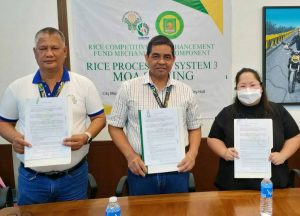 SORSOGON and Cabanatuan City will be getting rice processing systems (RPS) from the program spearheaded by the Philippine Center for Postharvest Development and Mechanization (PHilMech) to modernize the country’s rice sector.
SORSOGON and Cabanatuan City will be getting rice processing systems (RPS) from the program spearheaded by the Philippine Center for Postharvest Development and Mechanization (PHilMech) to modernize the country’s rice sector.
PHilMech said the RPS for Sorsogon will benefit the municipalities of Juban and Gubat, and consists of two units of mechanical dryers with 6 tons drying capacity per batch and a state-of-the-art rice mill with 1.5-ton milling capacity per hour. The total worth of the RPS is P16 million.
The agency has already delivered 573 units of various agricultural machines to the province under the RCEF-Mechanization Program amounting to P301.6 million.
PHilMech said the RPS, to be established in Cabanatuan in Nueva Ecija, is composed of three units of 12-ton capacity recirculating dryers and one unit of 4 to 5 tons per hour capacity multipass rice mill. The total cost is P71 million.
The agency said it was able to deliver 23 units of various agricultural machines to the city under the RCEF-Mechanization Program amounting to a total of P33.7 million.
On June 27, 2023, PHilMech’s RPS Team also conducted a comprehensive training needs assessment for the three beneficiaries of the drying and milling facilities under the RCEF-Mechanization Program in Pampanga.
The team visited the Santa Ana Multipurpose Cooperative and Guran-Sapa Multipurpose Cooperative in Santa Ana, Pampanga that are beneficiaries of an RPS equipped with a 1.5 tons per hour multistage rice mill and two units of 6 tons recirculating dryers.
PHilMech said the team also assessed the Cruzian Multipurpose Cooperative based in Magalang town in Pampanga that was among the few select beneficiaries of the P72 million worth RPS that consisted of three units of mechanical dryers with a 12 tons per batch dual heat source capacity and a multistage rice mill with a capacity of 4 to 5 tons per hour.
The agency said the assessment will identify the specific requirements and areas for improvement of the cooperatives’ rice processing operations.
“The team’s evaluation results would be helpful in developing training programs that can address the beneficiaries’ unique needs and optimize the utilization of their advanced machinery,” PHilMech said. (Leander C. Domingo, The Manila Times)











